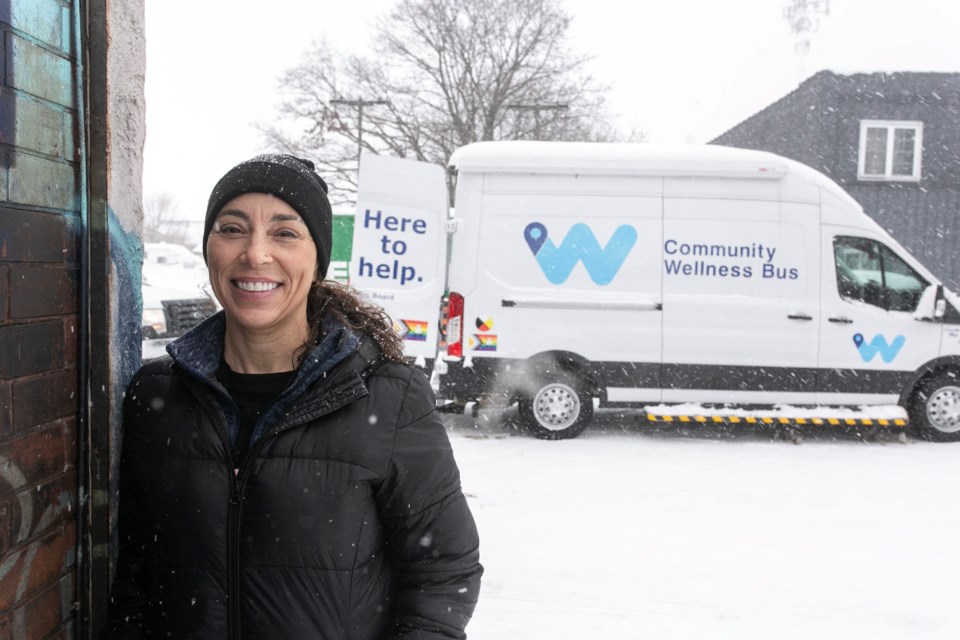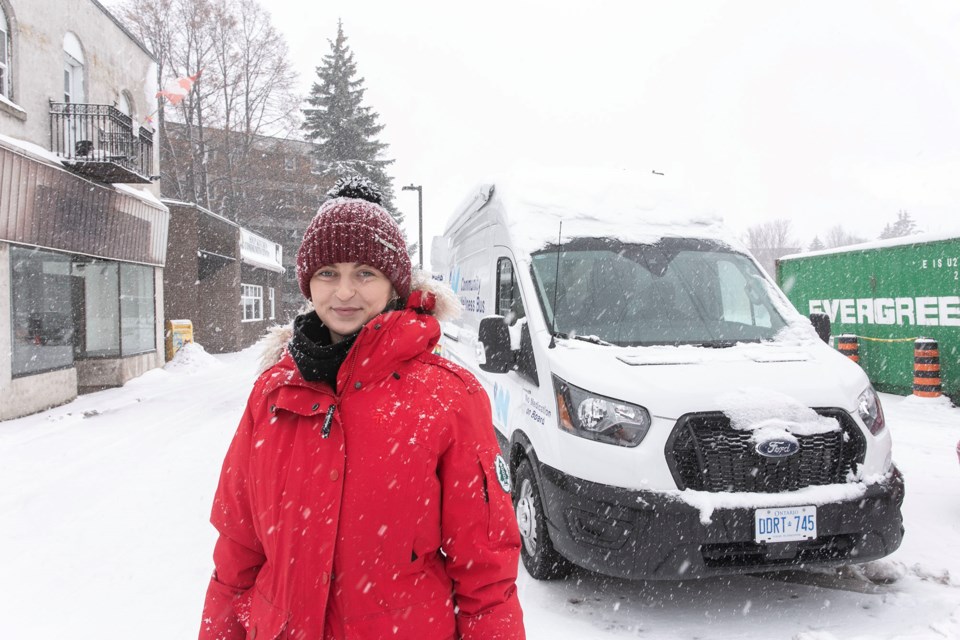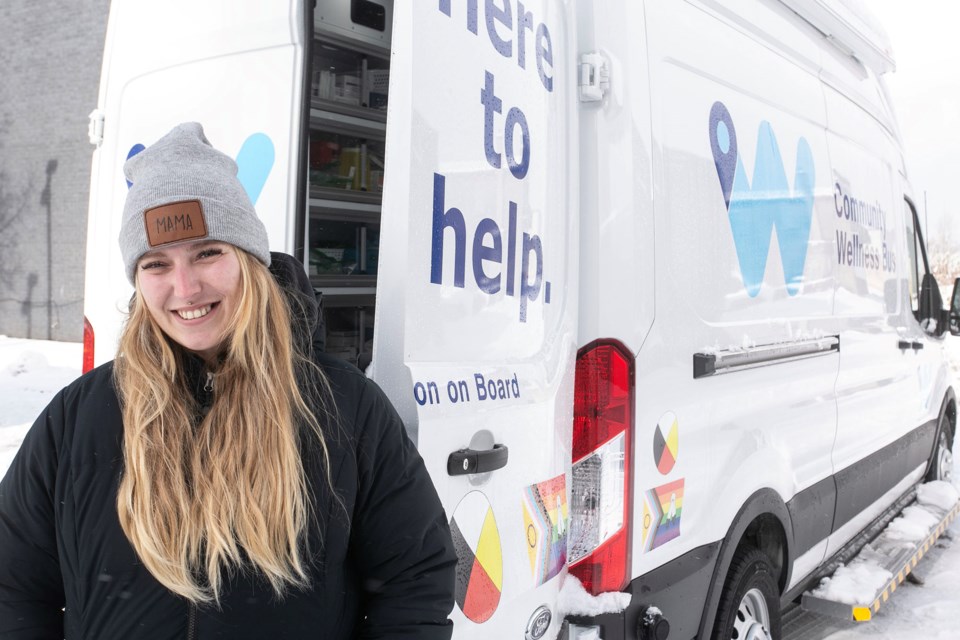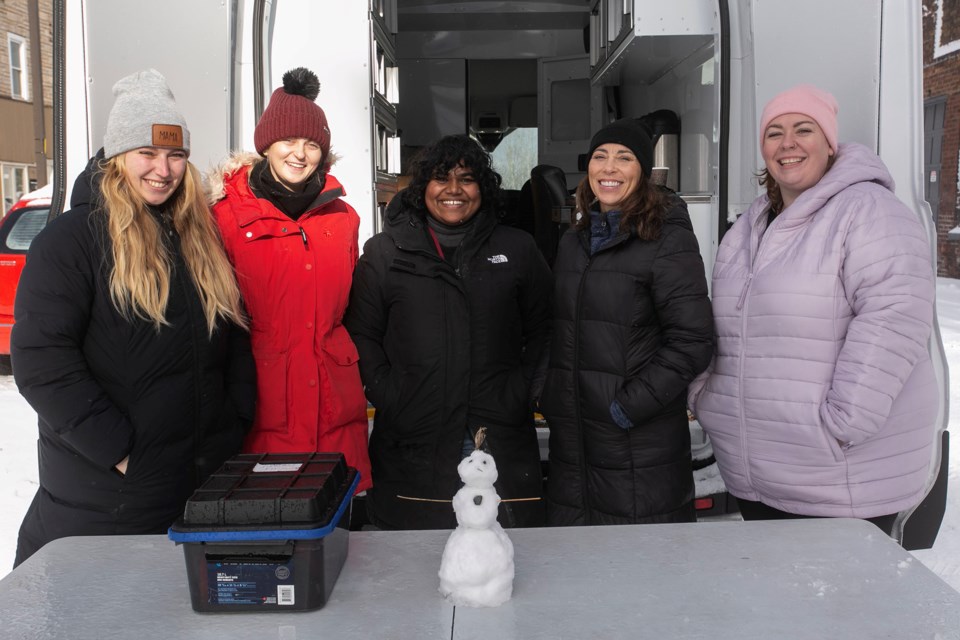The shiny white Community Wellness Bus that recently began servicing the streets of Sault Ste. Marie may be brand new, but its all-hands-on-deck mission between local agencies is the same as the purple one it replaces.
On Monday, the all-new white Community Wellness Bus (CWB) officially went into service. It is taller than the former purple CWB and customized to offer a more comfortable environment with more features for staff and the community members it serves.
Those customizations include an examination table and bench, running water and more privacy options for treating clients.
Rose Genua-Brennan, supervisor for CMHA, said the CWB program is sometimes utilized by people living with addiction and experiencing homelessness, but noted they aren't its only clientele.
"The bus isn't just for our most vulnerable. It's for anybody in the community that requires supports and services — it's basically a resource for our entire community," Genua-Brennan said.
The CWB program is an innovative collaboration led by Canadian Mental Health Association of Algoma (CMHA) and Sault Area Hospital, in partnership with the Group Health Centre, Algoma Family Services, Social Services and the Superior Family Health Team.
Those members come together to bring basic medical care to people at the street-level, while also offering basic necessities and harm reduction supplies — or sometimes just someone to talk to.
The CWB program was recently recognized with a Community Builders Award for the work it does in the community.
The previous purple vehicle was a decommissioned ambulance that went into service as the Sault's first Community Wellness Bus in 2021. Although it fit the needs of the program most of the time, the years and kilometres it spent as an ambulance occasionally forced it off the road for repairs.
In those three years it was in service, the purple bus had over 11,000 interactions with people across 10 sites in the community.
"It was very well used and very well loved," Genua-Brennan said.
With fewer expected repairs on a brand new vehicle, Genua-Brennan expects much less downtime over the previous bus.
"Our finances are going back into the community aspect of the bus, not paying for repairs. That was constant with the other one," she said

Maddy Latulippe is a nurse who has worked on the CWB for almost three years, while also splitting her time treating patients at Northway Wellness Centre.
She said working on the CWB is a different kind of nursing than she has experienced in more traditional settings. A lot of the work she does on the bus is done with the goal of promoting trust with the clients, many of whom will not seek out care.
"I love meeting people with where they're at and, for a lot of individuals that need any kind of nursing support, they are reluctant to go to the hospital or they won't stay there to wait to be seen," Latulippe said.
Most of the time, nurses on the CWB can provide basic care for relatively minor ailments, like wound care. By addressing them when they are relatively minor, it can take pressure off the system by potentially preventing a visit to the emergency room.
"By then their wounds could be infected, and they would need to be hospitalized, on IV and antibiotics," she said.
Meeting people at street level allows Latulippe and other nurses who serve on the bus to open discussions about seeking treatment that they might not otherwise have.
"I'm able to have those conversations with them and give them some information and kind of ease some of their reluctance to want to go," she said.
In one case, Latulippe said she was eventually able to convince one repeat client to attend to the emergency department at the hospital, where they were met with members of the Addictions Medicine and Consult Team.
"That was a real win, right? For them to even be willing to go back," said Latulippe.

Algoma Family Services is one of the partner agencies that sends employees to help staff the bus on its stops in the community. Jenny King began working there as a counsellor about three months ago and was almost immediately placed on the CWB.
King said she enjoys getting to know the clients and building relationships on the two days a week she typically spends on the bus.
"I think that's a really important piece, getting to know the person not just the problem. You have got to really see the person and make connections with people in the community."
For King, just providing someone with a pair of warm socks or other necessities of life can make for a rewarding day on the bus.
"I may not make a huge change in their day, but I perhaps contributed to making it a little bit better, which is what we're here for," she said.

Peer support workers are a big part of the successes the CWB program has had in reaching people living with addiction in the community. Emily Giovagnoli and the other peer workers use their lived experience to offer support to people living with addiction.
"I'm here for the clients that come to the bus because they need someone to talk to — someone who is an understanding person," said Giovagnoli. "I'm also a recovering addict, so I understand a lot of what they're going through."
Giovagnoli said working on the bus is a way for her to give back to the community and to give thanks to the few people who went out of their way to offer her support when she needed it.
"When I was using, I wasn't always shown the kind of compassion, respect or humility that I want to be able to show these people," she said.
"They are still people and they deserve to be helped."
There has been some controversy for years surrounding giving out harm reduction supplies like pipes and syringes to people living with addiction. Giovagnoli said she doesn't agree that handing out clean supplies is enabling the problem.
"That's a huge part of helping them by not spreading the diseases, by giving them clean supplies and preventing them from having to go to the hospital. The emergency rooms are backed up as it is," said Giovagnoli.
The CWB also collects used syringes and, as a member of the Downtown Ambassadors, Giovagnoli also spends time in the community cleaning up areas where used supplies have been left behind.
